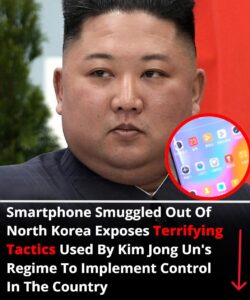Smuggled Phone Exposes Disturbing Depths of Kim Jong Un’s Surveillance State

A smartphone secretly carried out of North Korea has shed new light on just how deeply Kim Jong Un’s regime intrudes into the private lives of its citizens.
For decades, the country has been shrouded in secrecy, ruled by the Workers’ Party of Korea since its creation in 1948. Few outsiders gain access, and most knowledge about daily life there comes from defectors who manage to escape. Now, for the first time, a piece of everyday technology has revealed the chilling extent of state control.
BBC News gained access to a North Korean smartphone smuggled across the border within the last year. At a glance, the device looks like any standard handset you’d see in Europe or the U.S. But beneath the surface lies a system designed for relentless surveillance and censorship.
Investigators found that the phone automatically captured screenshots every five minutes—storing them in hidden folders ordinary users could never reach, but officials could. This built-in monitoring tool ensured that nothing on the device truly remained private.
Even language itself is manipulated. BBC reporter Jean Mackenzie demonstrated how typing the word “oppa”—a term of affection in South Korea—was instantly corrected to “comrade.” In North Korea, the word is only tolerated in its literal sense of “older brother,” stripped of any romantic nuance. Similarly, attempts to type “South Korea” were replaced with “puppet state,” reflecting Pyongyang’s official propaganda.
This strict policing of language and culture is part of a larger war on outside influence. For years, South Korean activists have tried to smuggle in USB drives and bottles filled with K-dramas and K-pop songs. But those caught consuming foreign media face brutal punishment. Reports suggest that dozens of teenagers were executed last year for secretly watching South Korean shows—a stark reminder of how merciless the crackdown can be.
Martyn Williams, an expert on North Korea’s media systems, told the BBC that smartphones are now central to the regime’s indoctrination strategy:
“So much of the Kim family’s mythology is fabricated. The phones make it easier for the state to reinforce those lies and shut out competing truths.”
The BBC also spoke with Kang Gyuri, a young defector who escaped in 2023. Now living in South Korea, she reflected on how oppressive life felt back home:
“I used to believe every country was like that. The government’s control was so suffocating that I thought it was normal. Only after I left did I understand—it was just North Korea.”
What this single phone reveals is more than just censorship—it’s a portrait of a regime determined to shape thought, erase identity, and monitor its people down to their very words.